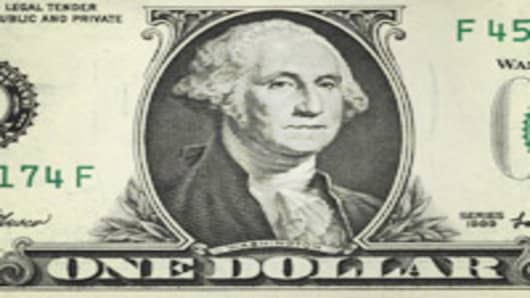This year's relentless U.S. dollar slide looked to be turning into a rout on Wednesday, one that could heap more pressure on already stressed world markets and require a verbal or active protest by the world's central banks.
For much of 2007, the dollar decline to record lows against the world's most-traded currencies has been a slow grind -- irritating for euro zone exporters and policymakers but largely tolerated as a price to pay to help offset the weakening U.S. economy and the euro cost of higher oil prices.
Central bankers around the globe have turned a blind eye as a result, eschewing talk of lines in the sand that they would defend and preferring to repeat mantras on preserving orderly markets rather than steering currency value.
But experts say that stance may need to change after Wednesday precisely because the dollar decline is starting to become disruptive and to directly infect asset markets already stretched from months of credit turmoil.
The absence of overt concern from the U.S. Treasury or other finance chiefs of the Group of Seven economic powers has been seen as an endorsement of its decline and the currency has started to behave like a one-way bet, bankers said.
"If you look at the last fortnight -- the cyclical economic factors that should have strengthened the dollar have done nothing to turn it around," said Jim O'Neill, Chief Global Economist at Goldman Sachs.
"And the key thing this morning has been that asset markets are falling because of the (dollar) slide -- that's not happened for years," he said, adding that he thought the U.S. Treasury and European Central may now need to signal their displeasure.
Even though lower U.S. Federal Reserve interest rates to cope with a domestic housing bust and credit squeeze are at the heart of the dollar's problems, analysts reckon the Fed will find it riskier to cut rates if the dollar goes into freefall.
The fear is that a vicious circle develops that financial markets everywhere may suffer from that -- accentuating problems that have seen global banks write off tens of billions of dollars of distressed debt assets in recent months and tightening lending conditions for everyone.
Why Is It Different Now?
The dollar's slide accelerated in Asia on Wednesdayafter a Chinese official expressed Beijing's doubts about the dollar's status as a world reserve currency and it later notched up some of its biggest intraday losses in more than a year.
The euro/dollar exchange rate has risen more than 11 percent this year but some 9 percent alone in the last three months. On Wednesday it notched up a fresh record high of $1.4730, almost two cents above the equivalent high set by the old German mark in 1995.
Volatility too is rising as the move gathers pace. One-month implied volatility for euro/dollar surged more than one percentage point to 8.5 percent -- its highest since the height of the August credit crisis and almost twice the year's trough in June.
But critically, it was the sharp lock-step slide in world equities early in Europe on Wednesday that raised most eyebrows.
Key dollar-denominated commodity prices such as crude oil and gold were also supercharged higher toward record levels by the greenback's slide.
"The dollar is moving into a very dangerous phase -- marking a change from the benign depreciation seen over recent years, which had generally been associated with higher asset prices," said Chris Turner, currency strategist at ING.
"Today's moves are evolving into 'fast markets' and the disorderly adjustments that policymakers abhor," Turner said in a note to clients. "No doubt policymakers will be looking with concern at the sharp fall in global equities this morning."
Hedge Fund Heaven
But policymakers' attempts to calm the forex movements will risk drawing battles lines in currency markets that have historically tended to push prices to points where they get a policy response.
And "macro" hedge funds that specialize in speculative bets on currencies, interest rates and stock indices smell blood.
They see a policy conflict at the Fed between controlling inflation and preventing this year's housing bust and credit crunch leading to recession and job losses.
Many traders are prepared to put money down that the Fed will opt for the latter, leading to more interest rate cuts and a tolerance for higher inflation and a much weaker dollar.
"Hedge funds love a policy conflict because they know something is going to break one way or another," said Avinash Persaud, chairman of consultancy Intelligence Capital. "Either U.S. employment breaks and we have a recession or we have a dollar crisis -- they're betting that the policymakers faced with that Hobson's choice will preserve employment."
Persaud said further dollar losses may be tolerated and even warranted but there would have to be some attempt to calm proceedings.
"The market is becoming disorderly -- prices are gapping lower and buyers in size are hard to find -- and so we should expect to see some central bank intervention."
A poll conducted by Reuters this week showed 31 analysts forecast a one-in-five chance that within the next year the European Central Bank, either on its own or with other central banks, will intervene in the market to sell euros and buy dollars.


